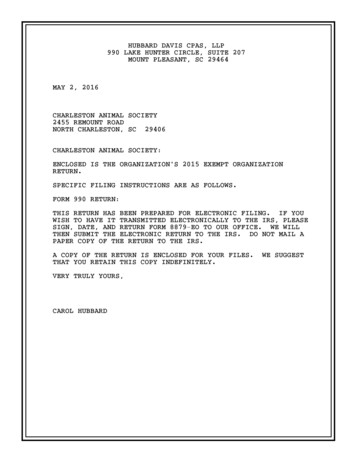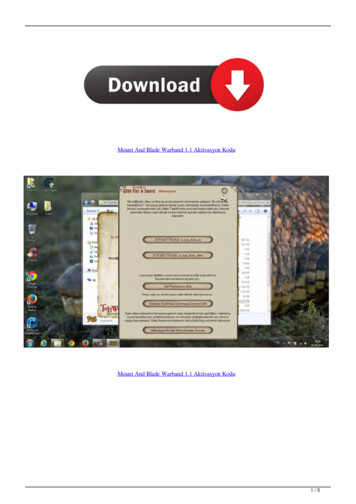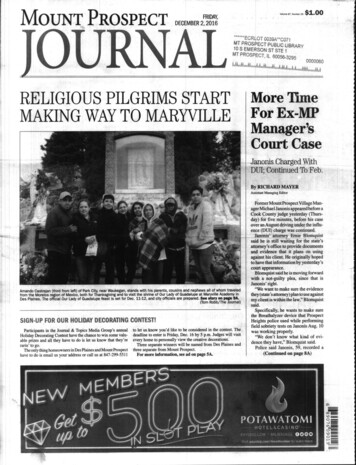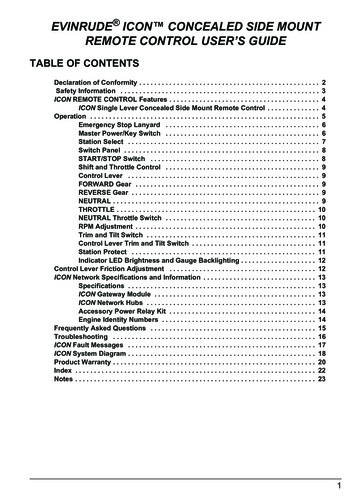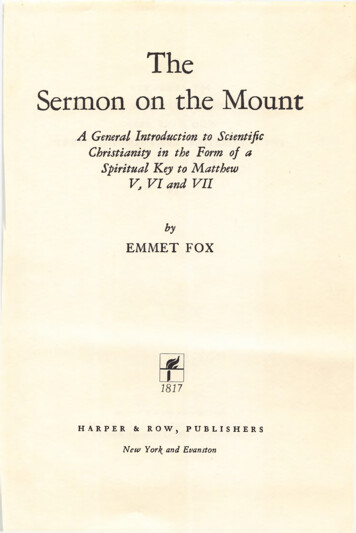
Transcription
TheSermon on the MountA General Introduction to ScientificChristianity in the Form o f aS p iritu al Key to M.atthewV .; V I and V I IbyE M M E T FO X1817HARPER&ROW,PUBLISHERSN ew Y or\ and Evanston
TOMYSTUD ENTSIN G R E A T B R IT A IN AN D A M E R IC AWHO HAVE B EENT H E IN S P IR A T IO N AND E N C O U R A G E M E N TB E H I N D T H I S BOOK#THE SERMON ON THE MOUNTCopyright, ¡934, 935, 93&, by Emmet FoxPrinted in the United States of America
C O N T E N T S#C hapterI. What Did Jesus Teach?iThe Beatitudes18III. As a M m Thinketh50IV . Resist Not Evil70II.V . Treasure in HeavenV I. With What MeasureYe MeteV II. By Their FruitsThe Lord's Pray er#921171 28155
PREFACEbook is the distilled essence of years of Bibleand metaphysical study, and of the many lecturesI have delivered. It would have been easier to have madeit twice its present length. M y object, however, is topresent the reader with a practical manual of spiritualdevelopment, and, with this end in view, I have con densed the subject matter into the smallest compass pos sible, because, as every student knows, conciseness ofexpression is of the greatest assistance in mastering anysubject.Do not imagine that you can assimilate all that it con tains in one or two readings. It should be gone over againand again until you have thoroughly grasped the utterlynew outlook upon life and the absolutely fresh scale ofvalues which the Sermon on the Mount presents to man kind. Only then will you experience the N ew Birth.T he study of the Bible is not unlike the search fordiamonds in South Africa. A t first people found a fewdiamonds in the yellow clay, and they were delightedwith their good fortune, even while they supposed thatthis was to be the full extent of their find.Then, upon digging deeper, they came upon the blueclay, and, to their amazement, they then found as manyprecious stones in a day as they had previously found ina year, and what had formerly seemed like wealth fadedinto insignificance beside the new riches.Th isvii
viiiPrefaceIn your exploration of Bible Truth, see to it that youdo not rest satisfied in the yellow clay of a few spiritualdiscoveries, but press on to the rich blue clay underneath.The Bible, however, differs from the diamond field inthe sublime fact that beneath the blue clay there aremore and still more and richer strata, awaiting the touchof spiritual perception—on and on to Infinity.A s you read the Bible, you should constantly affirmthat Divine Wisdom is enlightening you. That is the w ayto get direct inspiration.I have followed a convenient modern custom amongwriters of metaphysical books in capitalizing certainwords that signify aspects or attributes of God.
Chapter IW H A T D ID JE S U S T E A C H ?C h r i s t is easily the most important figure thathas ever appeared in the history of mankind. It makesno difference how you may regard him, you willhave to concede that. This is true whether you choose tocall him God or man; and, if man, whether you chooseto consider him as the world’s greatest Prophet andTeacher, or merely as a well intentioned fanatic whocame to grief, and failure, and ruin, after a short andstormy public career. However you regard him, the factwill remain that the life and death of Jesus, and the teach ings attributed to him have influenced the course of hu man history more than those of any other man who hasever lived; more than Alexander, or Caesar, or Charle magne, or Napoleon, or Washington. More people’s livesare influenced by his doctrines, or at least by the doctrinesattributed to him today; more books are written and readand bought concerning him; more speeches are made(call them sermons) concerning him; than concerning allthe other names mentioned put together.T o have been the religious inspiration of the wholeEuropean race throughout the two millenniums duringwhich that race has dominated and moulded the destiniesof the entire world, culturally and socially, as well aspolitically, and through the period in which the wholeesusJi
2The Sermon on the Mountof the earth’s surface was finally discovered and occu pied, and in its broad outlines shaped by civilization; thisalone entitles him to the premier position in world im portance.There can hardly, therefore, be a more importantundertaking than to inquire into the question of whatJesus really did stand for.What did Jesus teach? W hat did he really wish us tobelieve and to do? W hat were the objects that he reallyhad at heart? And how far did he actually succeed inaccomplishing these objects in his life and in his death?H ow far has the religion or movement called Chris tianity, as it has existed for the last nineteen centuries,really expressed or represented his ideas? H ow far doesthe Christianity of today present his message to theworld? If he should come back now, what would he sayof the self-styled Christian nations in general, and of theChristian churches in particular—of the Anglicans, theBaptists, the Catholics, the Greek Orthodox, the Metho dists, the Presbyterians, the Quakers, the Salvationists,the Seventh D ay Adventists, or the Unitarians; to citethem alphabetically? W hat did Jesus teach?This is the question which I have set myself to answerin this book. I propose to show that the message whichJesus brought has a unique value because it is the Truth,and the only perfect statement of the Truth of the na ture of God and of man, and of life, and of the world;and of the relationships which exist between them. Andfar more than this, w e shall find that his teaching is nota mere abstract account of the universe, which would beof very little more than academic interest; but that it
What Did Jesus Teach?3constitutes a practical method for the development ofthe soul and for the shaping of our lives and destiniesinto the things that w e really wish them to be.Jesus explains to us what the nature of God is, andwhat our own nature is; tells us the meaning of life andof death; shows us w h y we make mistakes; w hy we yieldto temptation; w hy we become sick, and impoverished,and old; and, most important of all, he tells us how allthese evils may be overcome, and how w e may bringhealth, happiness, and true prosperity into our lives, andinto the lives of others, if they really wish for them, too.The first thing that w e have to realize is a fact offundamental importance, because it means breaking awayfrom all the ordinary prepossessions of orthodoxy. Theplain fact is that Jesus taught no theology whatever. Histeaching is entirely spiritual or metaphysical. HistoricalChristianity, unfortunately, has largely concerned itselfwith theological and doctrinal questions which, strangeto say, have no part whatever in the Gospel teaching.It will startle many good people to learn that all thedoctrines and theologies of the churches are human in ventions built up by their authors out of their own men talities, and foisted upon the Bible from the outside; butsuch is the case. There is absolutely no system of the ology or doctrine to be found in the Bible; it simply isnot there. W orthy people who felt the need of some in tellectual explanation of life, and also believed that theBible was a revelation of God to man, drew the naturalconclusion that the one must be within the other; andthen, more or less unconsciously, proceeded to manu facture the thing that they wished to find. T h ey did not
*The Sermon on the Mounthave the spiritual or metaphysical key. T h ey were notupon what is called the Spiritual Basis, and consequentlythey sought a purely intellectual or three-dimensionalexplanation of life—and there can be no such ex planation.The actual explanation of man’s life lies in just thefact that he is essentially spiritual and eternal, and thatthis world, and the life that we know intellectually, is,so to speak, but a cross-section of the full truth concern ing him; and a cross-section of anything—from a machineto a horse—never can furnish even a partial explanationof the whole.Glimpsing one tiny corner of the universe, and thatwith only half-opened eyes, and working from an ex clusively anthropocentric and geocentric point of view,men built up absurd and very horrible fables about alimited and man-like God who conducted his universevery much as a rather ignorant and barbarous princemight conduct the affairs of a small Oriental kingdom.A ll sorts of human weaknesses, such as vanity, fickle ness, and spite, were attributed to this being. Then afar-fetched and very inconsistent legend was built upconcerning original sin, vicarious blood atonement, in finite punishment for finite transgressions; and, in certaincases, an unutterably horrible doctrine of predestinationto eternal torment, or eternal bliss, was added. N ow , nosuch theory as this is taught in the Bible. If it were theobject of the Bible to teach it, it would be clearly statedin a straight-forward manner in some chapter or other;but it is not.T h e “ Plan of Salvation” which figured so prominently
What Did Jesus Teach?5in the evangelical sermons and divinity books of a pastgeneration is as completely unknown to the Bible as itis to the Koran. There never was any such arrangementin the universe, and the Bible does not teach it at all.What has happened is that certain obscure texts fromGenesis, a few phrases taken here and there from Paul’sletters, and one or two isolated verses from other parts ofthe Scriptures, have been taken out and pieced togetherby divines, to produce the kind of teaching which itseemed to them ought to have been found in the Bible.Jesus knows nothing of all this. He is indeed anything buta Pollyanna, as they say, or cheap optimist. He warnsus, not once but often, that obstinacy in sin can bringvery, very severe punishment in its train, and that a manwho parts with the integrity of his soul—even though hegain the whole world—is a tragic fool. But he teachesthat we are only punished for—and actually punished by—our own mistakes; and he teaches that every man orwoman, no matter how steeped in evil and uncleanness,has always direct access to an all-loving, all-powerfulFather-God, who will forgive him, and supply His ownstrength to him to enable him to find himself again; andunto seventy times seven, if need be.Jesus has been sadly misunderstood and misrepresentedin other directions too. For instance, there is no warrantwhatever in his teaching for the setting up of any formof Ecclesiasticism, of any hierarchy of officials or systemof ritual. H e did not authorize any such thing, and, infact, the whole tone of his mentality is definitely antiecclesiastical. A ll through his public life he was at warwith the ecclesiastics and other religious officials of his
6The Sermon on the Mountown country. T h ey first hindered, and then persecutedhim, with a perfectly sound instinct of self-preservation—they felt instinctively that the Truth, as he taught it,was the beginning of the end for them—and they finallyhad him put to death. Their pretensions to authority asthe representatives of God, he ignored completely; andfor their ritual and their ceremonies he evinced only im patience and contempt.It seems that human nature is very prone to believewhat it wants to believe, rather than to incur the laborof really searching the Scriptures with an open mind.Perfectly sincere men, for example, have appointed them selves Christian leaders, with the most imposing andpretentious titles, and then clothed themselves in elabo rate and gorgeous vestments the better to impress thepeople, in spite of the fact that their Master, in the plain est language, strictly charged his followers that theymust do nothing of the kind. “ But be ye not called Rabbi:for one is your master, even Christ; and all ye are breth ren” {Matt. 23:8). And he denounced the Pharisees ashypocrites because “ they love the chief seats,” and “ bindheavy burdens, grievous to be borne,” with all sorts ofrules and regulations.Jesus, as we shall discover later on, made a special pointof discouraging the laying of emphasis upon outer ob servances; and, indeed, upon hard and fast rules and regu lations of every kind. W hat he insisted upon was a cer tain spirit in one’s conduct, and he was careful to teachprinciples only, knowing that when the spirit is right,details will take care of themselves; and that, in fact, “ theletter killeth, but the spirit giveth life,” as was so obvi
What Did Jesus Teach?7ously seen in the sad example of the Pharisees. Yet, inspite of this, the history of orthodox Christianity islargely made up of attempts to enforce all sorts of ex ternal observances upon the people. A striking case inillustration of this is the Puritan attempt to enforce theOld Testament Sabbath upon Christians, although theSabbath law was a purely Hebrew ordinance, and theferocious penalties involved in neglecting it applied ex clusively to the desecration of Saturday; and in spiteof the fact that Jesus particularly discouraged super stitious Sabbath observance, saying that the Sabbath wasmade for man and not man for the Sabbath, and makinga point of doing anything that he wanted to do upon thatday. H e clearly indicates throughout his teaching thatthe time has come when man must make each and everyday a spiritual Sabbath b y knowing and doing all thingsin a spiritual light.It is obvious that even if the Hebrew Sabbath werebinding upon Christians, then, since they do not observeit in keeping Sunday, they will still incur all the conse quences of Sabbath breaking.Many modem Christians do, however, realize thatthere is no system of theology in the Bible unless onelikes to put it there deliberately, and they have practi cally given up theology altogether; but they still clingto Christianity because they feel intuitively that it isthe Truth. There is really no logical justification fortheir attitude, since they do not possess the SpiritualK e y which alone makes the teaching of Jesus intel ligible, and so they endeavor to rati
It includes both af firmative and invocatory prayer, each of which is good in its own place; meditation; and the highest of all forms of prayer, which is contemplation. In the absence of prayer, all that you can do is to express the character that you have, in whatever cir cumstances you find yourself.
